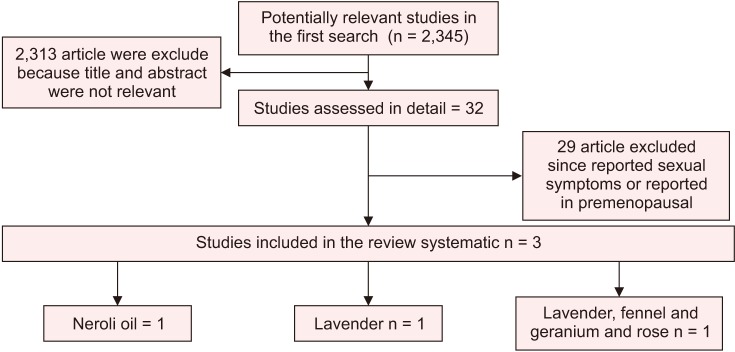J Menopausal Med.
2018 Apr;24(1):56-61. 10.6118/jmm.2018.24.1.56.
Aromatherapy for Sexual Problems in Menopausal Women: A Systematic Review and Meta-analysis
- Affiliations
-
- 1Evidence-Based Care Research Center, Mashhad University of Medical Sciences, Mashhad, Iran. masoumeh.ghazanfarpour@yahoo.com
- 2Department of Community Medicine, Imam Reza Clinical Research Units, Mashhad University of Medical Sciences, Mashhad, Iran.
- 3Department of Midwifery and Reproductive Health, Nursing and Midwifery School, Mashhad University of Medical Sciences, Mashhad, Iran.
- 4Department of Community Health and Psychiatric Nursing, School of Nursing and Midwifery, Mashhad University of Medical Sciences, Mashhad, Iran.
- 5Department of Medical Education, Mashhad University of Medical Sciences, Mashhad, Iran.
- KMID: 2429221
- DOI: http://doi.org/10.6118/jmm.2018.24.1.56
Abstract
OBJECTIVES
The aim of the present systematic review and meta-analysis is the exploration of the potential evidence of the effectiveness of aromatherapy products on the sexual function of menopausal women.
METHODS
From inception to December 2017, the search process was performed using the MEDLINE and Scopus databases and the Cochrane Library regarding the trials on the effectiveness of herbal-medicine aromatherapy on the sexual function of menopausal women.
RESULTS
Three of the trials comprise suitable data for inclusion in the meta-analysis. According to the meta-analysis, it is possible to improve the standardized mean difference (SMD) of the sexual desire up to 0.56 in the aromatherapy group compared with the control group (SMD = 0.56; P < 0.001; heterogeneity; I² = 42%; P = 0.141). According to one of the trials, the serum-estrogen level of two different doses did not change in the neroli oil inhalation group compared with the almond-oil group.
CONCLUSIONS
Both aromatherapy with neroli oil or lavender (monopreparation) and combined-oil aromatherapy with lavender, fennel, geranium, and rose significantly improved human sexual function; however, a significant change of the serum-estrogen level was not detected. The findings of the present review should be presented cautiously because of the corresponding limitations such as the lack of a standardized tool, the lack of intention-to-treat reporting, the low study amount, and the short-term follow-up.
Keyword
MeSH Terms
Figure
Reference
-
1. Ghazanfarpour M, Kaviani M, Abdolahian S, Bonakchi H, Najmabadi Khadijeh M, Naghavi M, et al. The relationship between women's attitude towards menopause and menopausal symptoms among postmenopausal women. Gynecol Endocrinol. 2015; 31:860–865. PMID: 26425992.
Article2. Nikjou R, Kazemzadeh R, Asadzadeh F, Fathi R, Mostafazadeh F. The effect of lavender aromatherapy on the symptoms of menopause. J Natl Med Assoc. 2017; DOI: 10.1016/j.jnma.2017.06.010.
Article3. Vaze N, Joshi S. Yoga and menopausal transition. J Midlife Health. 2010; 1:56–58. PMID: 21716773.4. Genant HK, Cooper C, Poor G, Reid I, Ehrlich G, Kanis J, et al. Interim report and recommendations of the World Health Organization Task-Force for Osteoporosis. Osteoporos Int. 1999; 10:259–264. PMID: 10692972.
Article5. Nappi RE, Cucinella L, Martella S, Rossi M, Tiranini L, Martini E. Female sexual dysfunction (FSD): Prevalence and impact on quality of life (QoL). Maturitas. 2016; 94:87–91. PMID: 27823751.
Article6. Malakouti J, Jabbari F, Jafarabadi MA, Javadzadeh Y, Khalili AF. The impact of ginkgo biloba tablet and aromatherapy inhaler combination on sexual function in females during postmenopausal period: A double-blind randomized controlled trial. Int J Womens Health Reprod Sci. 2017; 5:129–136.
Article7. Cardozo L, Bachmann G, McClish D, Fonda D, Birgerson L. Meta-analysis of estrogen therapy in the management of urogenital atrophy in postmenopausal women: second report of the Hormones and Urogenital Therapy Committee. Obstet Gynecol. 1998; 92:722–727. PMID: 9764689.8. Willhite LA, O'Connell MB. Urogenital atrophy: prevention and treatment. Pharmacotherapy. 2001; 21:464–480. PMID: 11310520.
Article9. Gompel A, Santen RJ. Hormone therapy and breast cancer risk 10 years after the WHI. Climacteric. 2012; 15:241–249. PMID: 22612610.
Article10. Taavoni S, Darsareh F, Joolaee S, Haghani H. The effect of aromatherapy massage on the psychological symptoms of postmenopausal Iranian women. Complement Ther Med. 2013; 21:158–163. PMID: 23642946.
Article11. Meherish S, Khandelwal S, Swarankar ML, Kaur P. Attitudes and practices of gynecologists in Jaipur toward management of menopause. J Midlife Health. 2010; 1:74–78. PMID: 21716769.12. Cavanagh HM, Wilkinson JM. Biological activities of lavender essential oil. Phytother Res. 2002; 16:301–308. PMID: 12112282.
Article13. Choi SY, Kang P, Lee HS, Seol GH. Effects of inhalation of essential oil of citrus aurantium L. var. amara on menopausal symptoms, stress, and estrogen in postmenopausal women: A randomized controlled trial. Evid Based Complement Alternat Med. 2014; 2014:796518. PMID: 25024731.
- Full Text Links
- Actions
-
Cited
- CITED
-
- Close
- Share
- Similar articles
-
- A Systematic Review of the Effects of Aromatherapy on Depression and Anxiety in Postmenopausal Women
- Effects of Aromatherapy on Menopausal Symptoms, Perceived Stress and Depression in Middle-aged Women: A Systematic Review
- Fatigue relief by aromatherapy use in prenatal and postnatal women: a systematic review and meta-analysis
- Effect of Lavender on Sleep, Sexual Desire, Vasomotor, Psychological and Physical Symptom among Menopausal and Elderly Women: A Systematic Review
- Effect of Aromatherapy on the Treatment of Psychological Symptoms in Postmenopausal and Elderly Women: A Systematic Review and Meta-analysis



